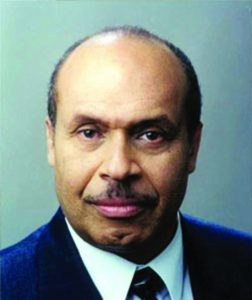 …new electoral mathematics! – Fmr Electoral Assoc Chair
…new electoral mathematics! – Fmr Electoral Assoc Chair
Professor Emeritus Errol Miller, a retired professor from the University of the West Indies versed in election matters, has waded into the debate on the no-confidence motion that was passed while calling on the Caribbean Court of Justice to render a decision that adheres to legal principles.
In a video broadcast dubbed Caribbean Commentary, Professor Miller, who is also a former Chairman of the Caribbean Association of Electoral Organisations, noted that the formula used to invalidate the passage of the 2018 no-confidence motion in Guyana’s Parliament simply does not add up.
He noted that if the same rationale used in Guyana’s case was used in Trinidad, then the twin island’s 41 House divided by two would equal 20.5 members, which rounded to a whole number would be 21, plus one, equalling 22. According to Miller, this would mean 43 votes to 41 members. A similar situation would hold true in Jamaica.
“More votes passed than is constitutionally eligible constitutes electoral malpractice in all Caribbean countries. It is commonly referred to as over voting. More votes cast than there are eligible persons to cast them.”
“One can only hope that the members of the learned profession representing both sides of this case before the CCJ will ensure that all legal procedures and all technicalities are strictly observed in a timely manner and that the varying points of view are argued with the highest levels of logic, facts and eloquence, such that the facts to be decided by the CCJ are with respect to law and merit.”
The no-confidence related matters before the Caribbean Court of Justice (CCJ) are expected to be heard on May 9 and 10. The three cases deal with Christopher Ram vs the Attorney General of Guyana, the Leader of the Opposition and Joseph Harmon; Opposition Leader Bharrat Jagdeo vs the Attorney General of Guyana, Dr Barton Scotland and Joseph Harmon; and Charrandas Persaud vs Compton Herbert Reid, Dr Barton Scotland, Bharrat Jagdeo and Joseph Harmon; the last of which deals with Persaud’s eligibility to vote in the House.
In the case of Ram vs the Attorney General, the political activist had petitioned the High Court to have Government resign and President David Granger call elections within 90 days as stipulated by Articles 106 (6) and (7) of the Constitution.
The Court of Appeal had ruled in a 2:1 split decision that a majority of 34 votes would have been needed to validly pass the no-confidence motion brought against the Government last year.
While Justice Rishi Persaud had dismissed the appeal and conferred with the ruling of the High Court, his colleague appellate Judges allowed the State’s appeal.
Both Justices Yonette Cummings-Edwards and Dawn Gregory opined that while 33 is the majority of the 65-member National Assembly, the successful passage of a no-confidence motion requires an “absolute majority” of 34, and not the “simple” majority of 33 that has been used to pass ordinary business in the House.



